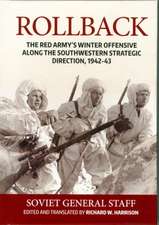Manifest Ambition: James K. Polk and Civil-Military Relations during the Mexican War: In War and in Peace: U.S. Civil-Military Relations
Autor John C. Pinheiroen Limba Engleză Hardback – 29 mar 2007 – vârsta până la 17 ani
Preț: 356.01 lei
Preț vechi: 415.28 lei
-14% Nou
Puncte Express: 534
Preț estimativ în valută:
68.14€ • 74.04$ • 57.28£
68.14€ • 74.04$ • 57.28£
Carte tipărită la comandă
Livrare economică 21 aprilie-05 mai
Preluare comenzi: 021 569.72.76
Specificații
ISBN-13: 9780275984090
ISBN-10: 0275984095
Pagini: 240
Dimensiuni: 156 x 235 x 26 mm
Greutate: 0.52 kg
Editura: Bloomsbury Publishing
Colecția Praeger
Seria In War and in Peace: U.S. Civil-Military Relations
Locul publicării:New York, United States
ISBN-10: 0275984095
Pagini: 240
Dimensiuni: 156 x 235 x 26 mm
Greutate: 0.52 kg
Editura: Bloomsbury Publishing
Colecția Praeger
Seria In War and in Peace: U.S. Civil-Military Relations
Locul publicării:New York, United States
Notă biografică
John C. Pinheiro is Assistant Professor of History at Aquinas College in Grand Rapids, Michigan. Co-editor of Volume 12 of the Presidential Series of the Papers of George Washington, his articles on the Mexican War have appeared in the Journal of the Early Republic, the Journal of Popular Culture, and in the anthology, Nineteenth-Century America (2005).
Recenzii
Pinheiro explores in detail the relationship between civil authorities, particularly President James K. Polk, and the military during the Mexican War..Pinheiro argues that Polk's leadership style, ability to overcome his partisan leanings when necessary, and management of Congress and the War Department allowed him to keep his cabinet in check and respond to critics, thus enabling him to achieve his aim of annexing California. This is not a book for the uninitiated, as Pinheiro assumes familiarity with the events of the Mexican War, but students, period and civil-military relations specialists, and readers with a background in these areas will gain a deeper understanding of the course of the war. A bonus is a selection of documents and excerpts that bear on the issues raised in the text. Recommended for academic and larger public libraries.
Rather than offering a narrative history of the Mexican War, this book analyzes key issues relating to its conduct at the federal level..John C. Pinheiro takes on a daunting task in his analysis of the Mexican War's complex politics. He has drawn on a wide array of primary and secondary sources and has asked important questions about the role of the president as an individual in wartime, the process by which executive power steadily expands, and the impact of partisan politics and the political ambitions of individuals on the conduct of war. These issues he raises are as timely as they are significant in understanding the American side of the war with Mexico.
Pinheiro considers the civil-military clashes during the Mexican War in terms of Jacksonian politics and doctrines, American beliefs about how to preserve liberty, and the American citizen-soldier tradition. He examines the roles of James K. Polk, Henry Clay, Gideon J. Pillow, Zachary Taylor, Winfield Scott, and John C. Fremont. He argues that Jacksonian attitudes, partisan politics, Americans' traditional aversion to professional armies, atrocities committed against Mexicans, and the requirements of conquest and occupation posed a significant risk to US military victory and the administration's objectives. He presents an overview of the 1820s-1840s and events of the war, and discusses the following themes: war preparations, the political and military effect of Jacksonian doctrines, discontent in the military, governments in areas of occupation, Polk's leadership style and personality, and the war in the context of American civil-military relations since the War of 1812.
. . . the book offers an evenhanded treatment of James K. Polk and the problems he faced as the nation's second commander in chief.
Rather than offering a narrative history of the Mexican War, this book analyzes key issues relating to its conduct at the federal level..John C. Pinheiro takes on a daunting task in his analysis of the Mexican War's complex politics. He has drawn on a wide array of primary and secondary sources and has asked important questions about the role of the president as an individual in wartime, the process by which executive power steadily expands, and the impact of partisan politics and the political ambitions of individuals on the conduct of war. These issues he raises are as timely as they are significant in understanding the American side of the war with Mexico.
Pinheiro considers the civil-military clashes during the Mexican War in terms of Jacksonian politics and doctrines, American beliefs about how to preserve liberty, and the American citizen-soldier tradition. He examines the roles of James K. Polk, Henry Clay, Gideon J. Pillow, Zachary Taylor, Winfield Scott, and John C. Fremont. He argues that Jacksonian attitudes, partisan politics, Americans' traditional aversion to professional armies, atrocities committed against Mexicans, and the requirements of conquest and occupation posed a significant risk to US military victory and the administration's objectives. He presents an overview of the 1820s-1840s and events of the war, and discusses the following themes: war preparations, the political and military effect of Jacksonian doctrines, discontent in the military, governments in areas of occupation, Polk's leadership style and personality, and the war in the context of American civil-military relations since the War of 1812.
. . . the book offers an evenhanded treatment of James K. Polk and the problems he faced as the nation's second commander in chief.

















